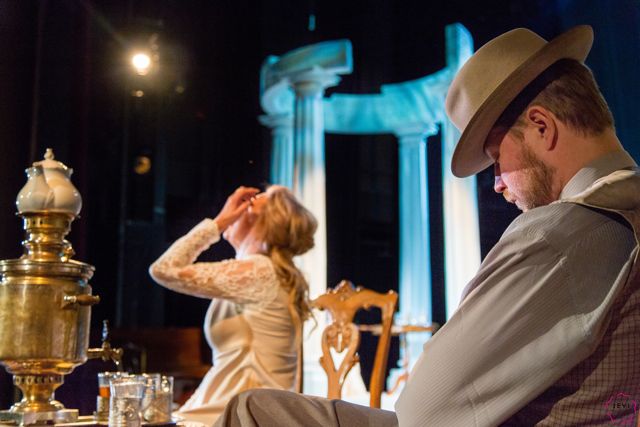
Theatre performance „Uncle Vanya“ at Russian Theatre.
Director: Igor Lõssov.
Stage designer: Izabella Kozinskaja.
Music composer: Aleksandr Žedeljov.
“Uncle Vanya” at Russian Theatre. Written by Anton Chekhov, directed by Igor Lõssov. Artist Isabella Kozinskaja, light designer Igor Kapustin, composer Aleksandr Žedeljov, director’s assistant Tatjana Kaur.
Cast: Leonid Ševtsov, Larissa Savankova, Natalja Dõmtšenko, Liidia Golovataja, Aleksandr Ivaškevitš, Oleg Rogatšov, Sergei Furmajuk, Jelena Jakovleva and Aleksandr Okunev.
Igor Lõssov’s production and Isabella Kozinskaja’s stage design can be regarded as quite Chekhovian as they manage to create a fitting atmosphere. What does “Chekhovian” exactly mean still remains a mystery and is open to interpretation, but one of its facets is undoubtedly the inevitability of everyday life and the boredom that stems from it. I cannot help but feel embarrassed for myself while watching the show, thinking thoughts like “maybe I demand too much from theatre – the magic of time travel, emotions grander than life?” I have to admit I am disappointed, feeling bored like an average theatregoer. Or like one of Chekhov’s characters: “I am dying of boredom, I don’t know what I should do.” (Jelena Andrejevna). It is the inevitable inability and incapability to do something that makes the viewer a (passive) part of the production. The audience is placed in a theatre-in-the-theatre situation – by taking up a role in Chekhov’s play the viewers can see themselves as one of the characters, sitting in the grand hall of the Russian Theatre, watching the antique (polystyrene) pavilion looming on the stage, impatiently waiting for the intermission. (The waiting isn’t necessarily negative; it is just that if the viewer acknowledges the show is in two acts and there will be an intermission, s/he will inevitably in a very Chekhovian way wait for it). Like Arkadina from “The Seagull”, watching the play with his son Konstantin, promoted as a presentation of the “new form”.
The scenographer Isabella Kozinskaja explains the impulse behind the stage design: “The Russian intelligentsia loves spending weekends at the background of picturesque ruins. This very smart and talented class leads the life of a tourist in their own country, admiring the quiet past (in ruins).” Following from the idea of the tourist (not the ruins) the intermission also continues in an authentically Chekhovian way – a slow promenade around the halls and corridors of the Russian Theatre, adorned with mirrors and golden ornaments; admiring these ornaments and again waiting for something.
However, double theatricalizing the evening in my mind is only one way of seeing something new and playful in the performance. As Chekhov’s way of addressing problems is relatively timeless – his are universally human concerns – it is hard to understand the director’s standpoint in the production as well as the lack of playfulness that was promised. It is equally difficult to agree with the artist that it is hard to create a contemporary Chekhovian stage. I am not claiming it is the easiest of tasks, but Chekhovian circumstances and dialogues surround us in every step of the way, while white antique pavilions are rather exceptional even in the context of Russian country estates.
“You must endure your sorrow, Uncle Vanya; you must endure it,” begs Sonya from Uncle Vanya in the last act of the play. With regard to everything that precedes it, it almost has a comical air to it. From the standpoint of the viewer it feels like the aim of producing a classical text is namely just to endure it. It is possible that the production is aimed at a different kind of target audience and it has a lot of sympathizers and adherents, but why does a young person like myself who finds Chekhov’s plays appealing and close to heart have to suffer in such a Chekhovian way in the theatre?
The play itself is beautiful and moving. In the production this beauty is only revealed at the moment when the characters disappear – when the actors take their bow. Jelena Andrejevna, whose beauty was so much praised, seemed as broken and fake in her white dress as the pillars that loomed behind her back; all of a sudden, however, taking a bow, she became a beautiful and gentle woman! The audience’s applause for the actors was deservedly dignified and loud – it is not easy for the performers nor the viewers to spend an evening in a theatrically constructed Chekhovian world. And more over in a place where they should have a chance to escape everyday life for a slight moment.
